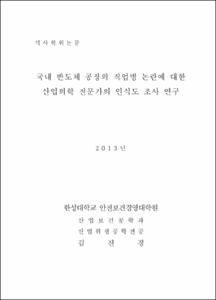국내 반도체 공장의 직업병 논란에 대한 산업의학 전문가의 인식도 조사 연구
= A surveillance on Awareness, Perceptions, and Opinions of Occupational Medical Professionals on Recent Controversies over the Occupational Disease Cases and Semiconductor Industries
- Files in This Item:
-
-
Download
 000001562883.pdf
기타 데이터 / 1.64 MB / Adobe PDF
000001562883.pdf
기타 데이터 / 1.64 MB / Adobe PDF
-
Items in Repository are protected by copyright, with all rights reserved, unless otherwise indicated.